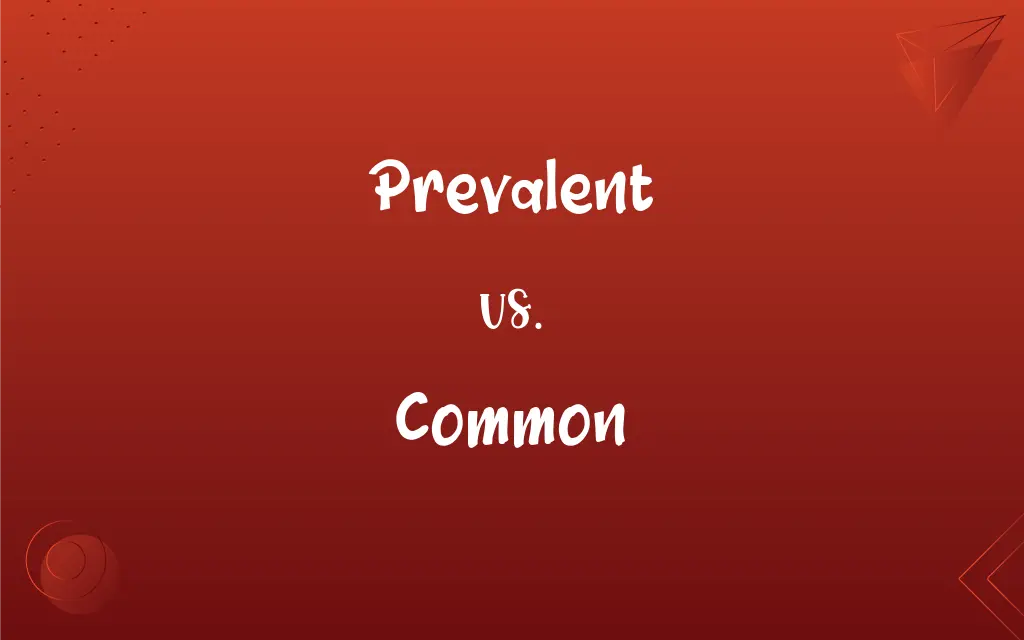Prevalent vs. Common: What's the Difference?
By Harlon Moss & Aimie Carlson || Updated on May 23, 2024
Prevalent means widespread or widely occurring in a particular area or at a particular time, often suggesting a noticeable or dominant presence. Common refers to something that is frequently encountered, suggesting regularity and familiarity.

Key Differences
Prevalent describes something that is widespread or dominant in a specific context, area, or time. It suggests a strong presence and noticeable influence. For example, if a particular trend or disease is prevalent, it means it is widely observed and significant in that context. Common, on the other hand, refers to something that occurs frequently and is familiar to many people. It implies regular occurrence without necessarily being dominant or widespread. For instance, a common cold is a type of illness that many people experience regularly.
Prevalent often implies a higher degree of occurrence or influence compared to common. For example, smoking might be prevalent in a specific community if a large portion of the population smokes, whereas catching a cold is common in general because many people experience it occasionally.
Common is used to describe things that are usual or typical, often without any specific emphasis on their extent. Prevalent, however, is used to highlight the extent and significance of occurrence, often in a more specific context or time period.
While both terms describe frequency, prevalent suggests a stronger and more impactful presence, whereas common suggests routine and expected frequency.
Comparison Chart
Definition
Widespread or widely occurring
Frequently encountered or experienced
ADVERTISEMENT
Degree of Occurrence
Higher, more significant presence
Regular, typical occurrence
Context
Specific area or time
General or broad
Example
Prevalent disease in a region
Common cold
Implication
Strong, noticeable influence
Regularity and familiarity
Prevalent and Common Definitions
Prevalent
Extensively found in certain conditions.
Allergies are prevalent during the spring season.
ADVERTISEMENT
Common
Usual or typical.
The common house cat is a popular pet.
Prevalent
Having a dominant influence or presence.
The use of smartphones is prevalent among teenagers.
Common
Shared by many people or things.
A common language helps unify a nation.
Prevalent
Commonly existing or accepted.
The belief that hard work leads to success is prevalent in many cultures.
Common
Belonging equally to or shared equally by two or more; joint
Common interests.
Prevalent
Widespread or widely occurring in a particular area or at a particular time.
Obesity is prevalent in many developed countries.
Common
Of or relating to the community as a whole; public
For the common good.
Prevalent
Frequently observed in a specific context.
Political corruption is prevalent in the region.
Common
Widespread; prevalent
Gas stations became common as the use of cars grew.
Prevalent
Widely or commonly occurring, existing, accepted, or practiced.
Common
Occurring frequently or habitually; usual
It is common for movies to last 90 minutes or more.
Prevalent
Widespread or preferred.
Common
Most widely known; ordinary
The common housefly.
Prevalent
Superior in frequency or dominant.
Common
Having no special designation, status, or rank
A common sailor.
Prevalent
(biology) A species that is prevalent in a certain area.
Common
Not distinguished by superior or noteworthy characteristics; average
The common spectator.
Prevalent
Gaining advantage or superiority; having superior force, influence, or efficacy; prevailing; predominant; successful; victorious.
Brennus told the Roman embassadors, that prevalent arms were as good as any title.
Common
Of no special quality; standard
Common procedure.
Prevalent
Most generally received or current; most widely adopted or practiced; also, generally or extensively existing; widespread; prevailing; as, a prevalent observance; prevalent disease.
This was the most received and prevalent opinion.
Common
Of mediocre or inferior quality; second-rate
Common cloth.
Prevalent
Encountered generally especially at the present time;
The prevailing opinion was that a trade war could be averted
The most prevalent religion in our area
Speculation concerning the books author was rife
Common
Unrefined or coarse in manner; vulgar
Behavior that branded him as common.
Common
Either masculine or feminine in gender.
Common
Representing one or all of the members of a class; not designating a unique entity.
Common
Commons The common people; commonalty.
Common
The social class composed of commoners.
Common
The parliamentary representatives of this class.
Common
Commons The House of Commons.
Common
A tract of land, usually in a centrally located spot, belonging to or used by a community as a whole
A band concert on the village common.
Common
The legal right of a person to use the lands or waters of another, as for fishing.
Common
Commons(used with a sing. verb) A building or hall for dining, typically at a university or college.
Common
Common stock.
Common
(Ecclesiastical) A service used for a particular class of festivals.
Common
Mutual; shared by more than one.
The two competitors have the common aim of winning the championship.
Winning the championship is an aim common to the two competitors.
Common
Occurring or happening regularly or frequently; usual.
It is common to find sharks off this coast.
Common
Found in large numbers or in a large quantity; usual.
Commoner used to be commoner, but more common is now more common.
Sharks are common in these waters.
It differs from the common blackbird in the size of its beak.
Common
Simple, ordinary or vulgar.
Common
(grammar) Of, pertaining or belonging to the common gender.
Common
(grammar) Of or pertaining to common nouns as opposed to proper nouns.
Common
Vernacular, referring to the name of a kind of plant or animal, i.e., common name vs. scientific name.
Common
(obsolete) Profane; polluted.
Common
(obsolete) Given to lewd habits; prostitute.
Common
Mutual good, shared by more than one.
Common
A tract of land in common ownership; common land.
Common
The people; the community.
Common
(legal) The right of taking a profit in the land of another, in common either with the owner or with other persons; so called from the community of interest which arises between the claimant of the right and the owner of the soil, or between the claimants and other commoners entitled to the same right.
Common
(obsolete) To communicate (something).
Common
(obsolete) To converse, talk.
Common
(obsolete) To participate.
Common
(obsolete) To have a joint right with others in common ground.
Common
(obsolete) To board together; to eat at a table in common.
Common
Belonging or relating equally, or similarly, to more than one; as, you and I have a common interest in the property.
Though life and sense be common to men and brutes.
Common
Belonging to or shared by, affecting or serving, all the members of a class, considered together; general; public; as, properties common to all plants; the common schools; the Book of Common Prayer.
Such actions as the common good requireth.
The common enemy of man.
Common
Often met with; usual; frequent; customary.
Grief more than common grief.
Common
Not distinguished or exceptional; inconspicuous; ordinary; plebeian; - often in a depreciatory sense.
The honest, heart-felt enjoyment of common life.
This fact was infamousAnd ill beseeming any common man,Much more a knight, a captain and a leader.
Above the vulgar flight of common souls.
Common
Profane; polluted.
What God hath cleansed, that call not thou common.
Common
Given to habits of lewdness; prostitute.
A dame who herself was common.
Common
The people; the community.
Common
An inclosed or uninclosed tract of ground for pleasure, for pasturage, etc., the use of which belongs to the public; or to a number of persons.
Common
The right of taking a profit in the land of another, in common either with the owner or with other persons; - so called from the community of interest which arises between the claimant of the right and the owner of the soil, or between the claimants and other commoners entitled to the same right.
Common
To converse together; to discourse; to confer.
Embassadors were sent upon both parts, and divers means of entreaty were commoned of.
Common
To participate.
Common
To have a joint right with others in common ground.
Common
To board together; to eat at a table in common.
Common
A piece of open land for recreational use in an urban area;
They went for a walk in the park
Common
Belonging to or participated in by a community as a whole; public;
For the common good
Common lands are set aside for use by all members of a community
Common
Of no special distinction or quality; widely known or commonly encountered; average or ordinary or usual;
The common man
A common sailor
The common cold
A common nuisance
Followed common procedure
It is common knowledge that she lives alone
The common housefly
A common brand of soap
Common
Common to or shared by two or more parties;
A common friend
The mutual interests of management and labor
Common
Commonly encountered;
A common (or familiar) complaint
The usual greeting
Common
Being or characteristic of or appropriate to everyday language;
Common parlance
A vernacular term
Vernacular speakers
The vulgar tongue of the masses
The technical and vulgar names for an animal species
Common
Of or associated with the great masses of people;
The common people in those days suffered greatly
Behavior that branded him as common
His square plebeian nose
A vulgar and objectionable person
The unwashed masses
Common
Of low or inferior quality or value;
Of what coarse metal ye are molded
Produced...the common cloths used by the poorer population
Common
Lacking refinement or cultivation or taste;
He had coarse manners but a first-rate mind
Behavior that branded him as common
An untutored and uncouth human being
An uncouth soldier--a real tough guy
Appealing to the vulgar taste for violence
The vulgar display of the newly rich
Common
To be expected; standard;
Common decency
Common
Frequently encountered or experienced.
It is common to see people jogging in the park in the morning.
Common
Occurring regularly or habitually.
It is common for students to feel stressed before exams.
Common
Familiar and widespread.
The use of social media is common among young adults.
FAQs
Can something be both prevalent and common?
Yes, something can be both prevalent and common if it is widespread and frequently encountered.
What does 'common' mean?
Common means frequently encountered or experienced, indicating regularity and familiarity.
What does 'prevalent' mean?
Prevalent means widespread or widely occurring in a specific area or time, suggesting a strong presence.
Does 'prevalent' imply frequency?
Yes, prevalent implies a high frequency and significant presence.
Can 'prevalent' refer to positive things?
Yes, prevalent can refer to both positive and negative things, like prevalent technology or prevalent diseases.
Is 'common' used for widespread issues?
Common is used for issues that occur frequently but doesn't necessarily imply widespread dominance.
Is 'prevalent' stronger in meaning than 'common'?
Yes, prevalent suggests a higher degree of occurrence or influence compared to common.
Can 'common' refer to unique situations?
No, common refers to typical or usual situations, not unique ones.
Is 'prevalent' used more in formal writing?
Yes, prevalent is often used in formal contexts to describe significant presence.
Can 'prevalent' describe cultural phenomena?
Yes, prevalent can describe cultural phenomena that are widely accepted or practiced.
Can 'common' describe everyday activities?
Yes, common is often used to describe everyday activities or occurrences.
Is a common issue necessarily widespread?
Common issues are frequent but not necessarily widespread in a dominant sense.
How do you use 'prevalent' in a sentence?
Smoking is prevalent among adults in this community.
How do you use 'common' in a sentence?
It is common to find coffee shops on every corner in the city.
Does 'common' suggest general occurrence?
Yes, common implies a general and routine occurrence.
Is 'common' suitable for everyday language?
Yes, common is suitable for both formal and informal contexts.
Can 'prevalent' be used for time-specific occurrences?
Yes, prevalent can describe things that are widespread during specific times.
Is a prevalent issue always a major concern?
Often, but not always. Prevalent issues are significant due to their widespread nature.
Does 'prevalent' suggest a specific context?
Yes, prevalent often refers to a specific area or time context.
Does 'common' imply a usual occurrence?
Yes, common implies something that is usual or typical.
About Author
Written by
Harlon MossHarlon is a seasoned quality moderator and accomplished content writer for Difference Wiki. An alumnus of the prestigious University of California, he earned his degree in Computer Science. Leveraging his academic background, Harlon brings a meticulous and informed perspective to his work, ensuring content accuracy and excellence.
Co-written by
Aimie CarlsonAimie Carlson, holding a master's degree in English literature, is a fervent English language enthusiast. She lends her writing talents to Difference Wiki, a prominent website that specializes in comparisons, offering readers insightful analyses that both captivate and inform.































































